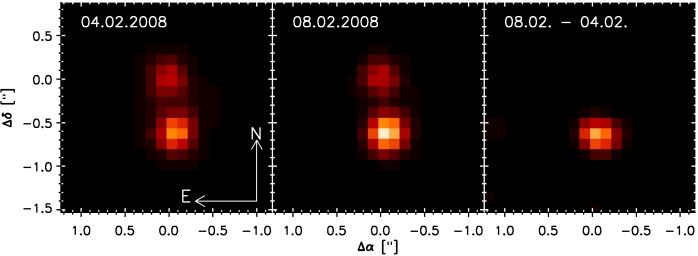| EPoS Contribution |
|
The infrared variability of T Tau S: disk-binary interaction observed?
Roy van Boekel Max-Planck-Institut für Astronomie, Heidelberg, Germany | |
|
Many young stars form in binary or multiple systems. Therefore, depending
on the orbital parameters, their disks may be strongly affected by the
gravitational influence of companion stars. The evolution of the disk and,
in early phases, the mass build-up of the central star is likely
substantially different in multiple systems compared to single stars.
Massive stars generally show high binary fractions and form in clusters
with high space densities of stars. Therefore, it is likely that most
massive star disks experienced substantial gravitational interaction with
binary companions or neighboring cluster members. Yet, there are few
observations constraining our understanding of disk-companion interaction.
The infrared companion of TTau is itself a close binary system, consisting of an intermediate-mass primary (A_v ~ 60 mag) and a sub-solar mass secondary. Due to its proximity, it can be studied in extraordinary detail. Based on an extensive analysis of the infrared variability of the TTau IRC, we will argue that this system represents an observable example of disk-binary interaction, in which each periastron passage of the companion causes an accretion "outburst" onto the primary. Due to their high binary frequency, the same process may strongly affect the disks of young high-mass stars during their early evolution. | |
 | |
| Caption: Infrared imaging of the TTau IRC (Southern source) at 12.8 micron with VLT/VISIR. The left and middle image were taken during two epochs in February 2008 separated by only 3.95 days. During this time, the IRC brightened by 0.25 mag, as can clearly be seen in the difference image on the right. Such fast brightness variations at such long wavelengths can only be due to substantial short-term variations in the intrinsic luminosity of the central source. | |
| Collaborators: A. Juhasz, MPIA Heidelberg, Germany G. Duchene, Berkely, USA Th. Henning, MPIA Heidelberg, Germany R. Koehler, LSW Heidelberg, Germany Th Ratzka, Uni Muenchen, Germany T. Herbst, MPIA Heidelberg, Germany J. Bouwman, MPIA Heidelberg, Germany W. Kley, Uni Tuebingen, Germany |
Suggested Session:
Early Phases of Disks |

